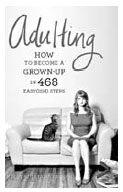Guide for those nearing adulthood
Updated: 2013-07-07 08:33
By Aimee Lee Ball(The New York Times)
|
|||||||

Kelly Williams Brown realized that she had not transitioned into adulthood when she was moving into a new apartment and her furniture, made of particleboard, disintegrated in the rain.
Ms. Brown, a 28-year-old advertising copywriter in Portland, Oregon, has now set out to become a source of advice for her generation, millennials, people who entered adulthood after the year 2000.
Her new book, "Adulting: How to Become a Grown-up in 468 Easy (ish) Steps," is meant to help guide 20-somethings who are just figuring out that food does not appear by itself in the refrigerator.
"One of the most jolting days of adulthood comes the first time you run out of toilet paper," Ms. Brown said. "Toilet paper, up until this point, always just existed."
The idea for "Adulting" (which has just been bought for television by J. J. Abrams, executive producer of the "Lost" series) was refined when Ms. Brown worked as a reporter for the Statesman Journal in Salem, Oregon, consulting her friends for a column about what skills or possessions they should have by the age of 30.
Those advisers inform the book, along with what the author calls "wise random strangers at bars" and a retinue of "experts": grief counselors; mechanics; etiquette savants; her parents; and a surgeon who says (in step No. 274), "I'd almost rather they use heroin with clean needles than smoke."
Ms. Brown's counsel bounces around many personal and professional issues, from career (No. 176: "Do not steal more than $3 worth of office supplies per quarter") to cooking (No. 74: "Oatmeal gives you an amazing amount of energy, like cocaine, if cocaine were really good for your digestion and didn't ruin lives").
One situation that ended up cut was how to help a friend who is having an abortion. "I have encountered it multiple times," she said, "but it was a little too close to the bone, and I didn't want to blindside people."
Most things that seem like an emergency or a disaster at age 21 are not, according to Ms. Brown (that's No. 390), and she suggests that freaking out is not the appropriate response to car trouble or wardrobe malfunctions - not that Ms. Brown doesn't sympathize. "The thing that usually causes me anguish isn't 'My friends are getting married and I'm not,' " she said. "It's opening my crisper drawer, which smells foul because I was thinking, optimistically, that I would learn to cook kale, and instead I have a vegetal slurry."
On the subject of office romances, she's stern (No. 163: "Live your life as though everyone in the office has plastic, featureless doll crotches") but forgiving (No. 162: "Having a poorly considered liaison with a co-worker is the chickenpox of the working life, so you may as well get it over with").
Ms. Brown now lives with real furniture (and a boyfriend), although her pantry still includes "one responsible choice of cereal and one that says 'I'm a 7-year-old.' " (This from a section of the book called "Procuring Food So You Don't Die.")
"I still don't feel like I'm an adult all the time," Ms. Brown said, "but I'm not writing to exorcise my demons. I want people to have some useful information, and I don't want them to feel less-than. These ideas are not moral judgments."
Indeed, part of her impetus in writing "Adulting" was to defend millennials against their reputation for being entitled and self-absorbed.
"The people I know in my age group are not aimless man-child caricatures," Ms. Brown said. "They don't spend the bulk of their time Instagramming brunch entrees. They, like every generation, sometimes struggle and sometimes succeed in the complicated process of becoming an adult. Millennials can be a little narcissistic, although I don't think there's anything weird about our collective character. We're coming of age in a time that's tough. But far be it from me to deny the older generation the pleasure of complaining about the younger."
The New York Times
(China Daily 07/07/2013 page10)